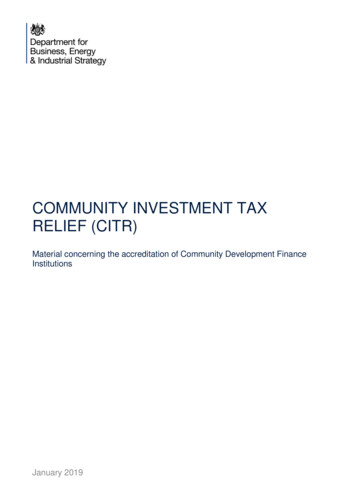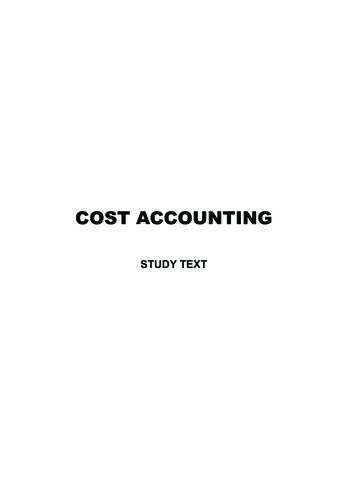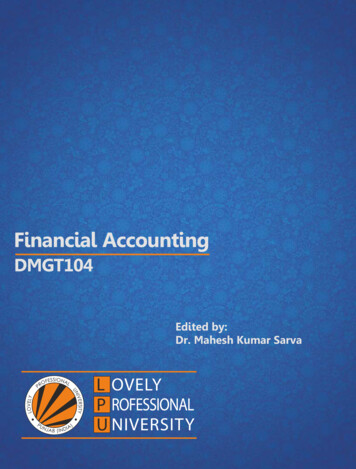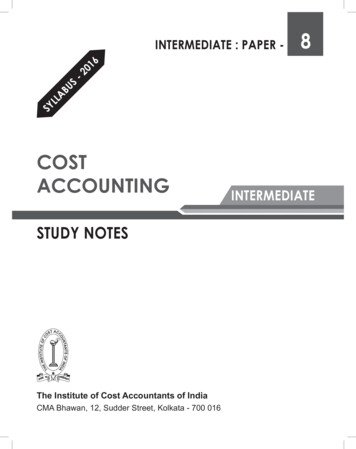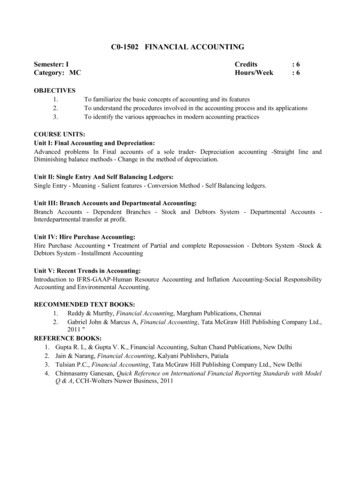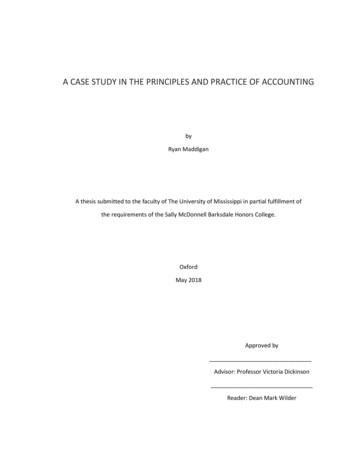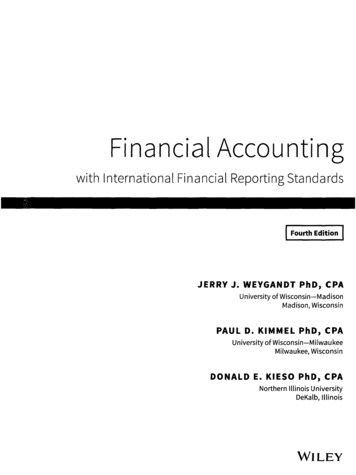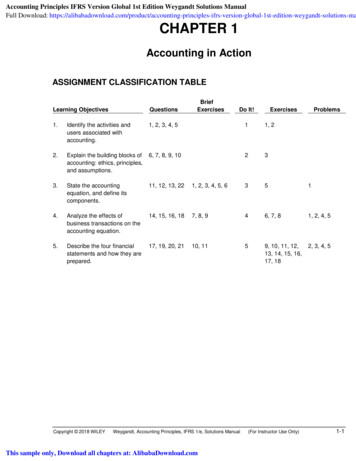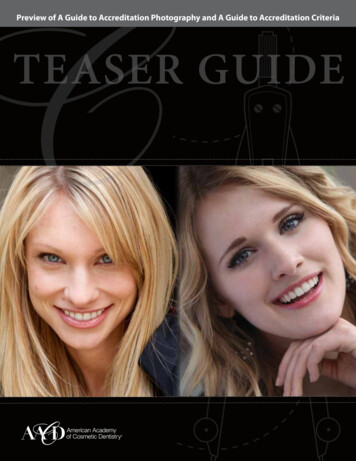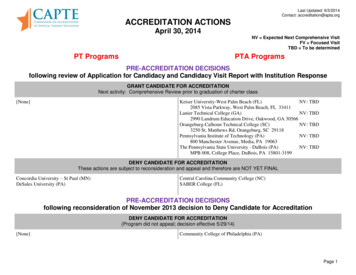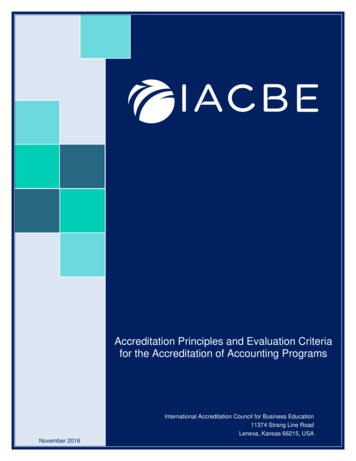
Transcription
Accreditation Principles and Evaluation Criteriafor the Accreditation of Accounting ProgramsInternational Accreditation Council for Business Education11374 Strang Line RoadLenexa, Kansas 66215, USANovember 2016
PREFACEThe International Accreditation Council for Business Education (IACBE) was founded in 1997 in responseto the expressed needs of presidents, chief academic officers, and business deans, chairs, and heads ofdepartments who wanted an accreditation process that was mission-driven and outcomes-based. TheIACBE provides specialized accreditation for the business programs of hundreds of institutions of highereducation throughout the world whose primary purpose is excellence in teaching and learning. TheIACBE’s innovative approach to the accreditation of business programs is based on the assessment ofeducational outcomes and the characteristics of excellence in business education.This manual is organized into the following five sections: Section One: This section contains an introduction that describes (i) the mission of the IACBE andspecial accounting accreditation, (ii) the IACBE’s philosophy of accounting accreditation, (iii) theIACBE’s Characteristics of Excellence in Accounting Education, (iii) the recommendations andobjectives from the Pathways Commission on Accounting Higher Education, (iv) the scope ofaccounting accreditation, and (v) eligibility criteria for special accounting accreditation. Section Two: This section provides instructions for preparing the self-study. Section Three: This section contains general background information pertaining to the academicaccounting unit and the accounting programs that it offers. Section Four: This section contains the IACBE’s accounting accreditation principles, evaluationcriteria, and guidelines for addressing each principle in the self-study. Section Five: This section contains appendices.Copyright 2016 by the International Accreditation Council for Business Education Lenexa, Kansas USAi
TABLE OF CONTENTSPREFACE . iTABLE OF CONTENTS .iiLIST OF TABLES .ivSECTION ONE: INTRODUCTION . 1Mission of the IACBE and Accounting Accreditation . 1Philosophy of Accounting Accreditation . 1Characteristics of Excellence in Accounting Education . 2The Pathways Commission on Accounting Higher Education: Recommendations and Objectives . 4Scope of Accounting Accreditation . 7Eligibility Criteria for Special Accounting Accreditation . 9SECTION TWO: PREPARING THE SELF-STUDY . 11Volume 1 . 12Volume 2 . 12SECTION THREE: ORGANIZATIONAL AND PROGRAMMATIC PROFILE . 13SECTION FOUR: ACCOUNTING ACCREDITATION PRINCIPLES . 18Principle A1: Commitment to Integrity, Responsibility, and Ethical Behavior . 21A1.1: Commitment to Integrity, Responsibility, and Ethical Behavior . 22A1.2: Summary Reflection on the Commitment to Integrity, Responsibility, and Ethical Behavior . 23Principle A2: Quality Assessment and Advancement . 24A2.1: Assessment Planning . 26A2.2: Assessment of Student Learning and Operational Effectiveness . 30A2.3: Continuous Quality Improvement . 37A2.4: Summary Reflection on Quality Assessment and Advancement . 42Principle A3: Strategic Planning . 43A3.1 Strategic Planning . 45A3.2 Summary Reflection on Strategic Planning . 48Principle A4: Accounting Curricula and Learning Opportunities . 49A4.1 Accounting Program Development and Design . 51A4.2 Curricula of Undergraduate-Level Accounting Programs . 64A4.3 Curricula of Master’s-Level Accounting Programs . 74A4.4 Curricula of Doctoral-Level Accounting Programs . 82A4.5 International Dimensions of Accounting . 86A4.6 Information Technology Skills . 88A4.7 Curriculum Review, Renewal, and Improvement . 89A4.8: Summary Reflection on Accounting Curricula and Learning Opportunities . 90ii
Principle A5: Accounting Faculty Characteristics, Activities, and Processes . 91A5.1: Qualifications of Accounting Faculty . 93A5.2: Deployment of Accounting Faculty . 99A5.3: Scholarly and Professional Activities of Accounting Faculty . 110A5.4: Professional Development of Accounting Faculty . 117A5.5: Evaluation of Accounting Faculty. 120A5.6: Summary Reflection on Accounting Faculty Characteristics, Activities, and Processes . 122Principle A6: Student Policies, Procedures, and Processes . 123A6.1: Admissions Policies and Procedures . 124A6.2: Academic Policies and Procedures . 126A6.3: Career Development and Planning Services . 129A6.4: Summary Reflection on Student Policies, Procedures, and Processes . 130Principle A7: Resources Supporting Accounting Programs . 131A7.1: Financial Resources Supporting Accounting Programs . 132A7.2: Facilities Supporting Accounting Programs . 135A7.3: Learning Resources Supporting Accounting Programs. 136A7.4: Technological Resources Supporting Accounting Programs . 137A7.5: Other Instructional Locations . 138A7.6: Summary Reflection on Resources Supporting Accounting Programs . 139Principle A8: External Relationships . 140A8.1: External Linkages with the Accounting Community . 142A8.2: External Accountability . 144A8.3: Summary Reflection on External Relationships . 146Principle A9: Innovation in Accounting Education . 147A9.1: Innovation in Accounting Education. 149A9.2: Summary Reflection on Innovation in Accounting Education . 150SECTION FIVE: APPENDICES. 151Appendix A: Foundational Accounting Core Competency Dimensions of the Pathways Commissionon Accounting Higher Education . 152Appendix B: Cover Page of Self-Study . 158Appendix C: Curriculum Vita Outline. 159Appendix D: Credentials Summary for Accounting Faculty . 170Appendix E: Qualification Justification for Accounting Faculty . 173iii
LIST OF TABLESTable OPP-1: Accounting Programs Included in the Accreditation Review . 16Table OPP-2: Public Notification of Accreditation . 16Table OPP-3: Institutional and Business Program Enrollments . 17Table OPP-4: Number of Students in Accounting Programs . 17Table OPP-5: Number of Accounting Students by Program Level . 18Table OPP-6: Degrees Conferred in Accounting Programs . 18Table OPP-7: Number of Accounting Faculty . 18Table A2-1: Student Learning Assessment Results (Associate-Level Programs). 32Table A2-1: Student Learning Assessment Results (Bachelor’s-Level Programs) . 33Table A2-1: Student Learning Assessment Results (Master’s-Level Programs). 34Table A2-1: Student Learning Assessment Results (Doctoral-Level Programs) . 35Table A2-2: Operational Assessment Results . 36Table A2-3: Summary of Changes and Improvements Needed . 39Table A2-4: Summary of Action Plans . 40Table A2-5: Summary of Realized Outcomes. 41Table A4-1: General Program Structure and Design . 55Table A4-2: Program Delivery Modes . 55Table A4-3: Mapping of Curriculum to Intended Student Learning Outcomes (ISLOs) and FoundationalAccounting Core Competency (FACCDs) Dimensions (Associate-Level Programs) . 56Table A4-3: Mapping of Curriculum to Intended Student Learning Outcomes (ISLOs) and FoundationalAccounting Core Competency (FACCDs) Dimensions (Bachelor’s-Level Programs) . 58Table A4-3: Mapping of Curriculum to Intended Student Learning Outcomes (ISLOs) and FoundationalAccounting Core Competency (FACCDs) Dimensions (Master’s-Level Programs) . 60Table A4-3: Mapping of Curriculum to Intended Student Learning Outcomes (ISLOs) and FoundationalAccounting Core Competency (FACCDs) Dimensions (Doctoral-Level Programs) . 62Table A4-4: Summary of Accounting Technical Knowledge (ATK) Coverage in Undergraduate Programs(Associate-Level Programs) . 68Table A4-4.SIR: Summary of Accounting Technical Knowledge (ATK) Coverage in UndergraduatePrograms (Associate-Level Programs)-Specialized Industry Requirements . 69Table A4-4.STA: Summary of Accounting Technical Knowledge (ATK) Coverage in UndergraduatePrograms (Associate-Level Programs)-Special Topics in Accounting. 70Table A4-4: Summary of Accounting Technical Knowledge (ATK) Coverage in Undergraduate Programs(Bachelor’s-Level Programs). 71Table A4-4.SIR: Summary of Accounting Technical Knowledge (ATK) Coverage in UndergraduatePrograms (Bachelor’s-Level Programs)-Specialized Industry Requirements . 72Table A4-4.STA: Summary of Accounting Technical Knowledge (ATK) Coverage in UndergraduatePrograms (Bachelor’s-Level Programs)-Special Topics in Accounting . 73Table A4-5: Summary of Accounting Technical Knowledge (ATK) Development in Master’s-LevelPrograms . 79iv
Table A4-5.SIR: Summary of Accounting Technical Knowledge (ATK) Development in Master’s-LevelPrograms-Specialized Industry Requirements. 80Table A4-5.STA: Summary of Accounting Technical Knowledge (ATK) Development in Master’s-LevelPrograms-Special Topics in Accounting . 81Table A4-6: Student Doctoral Research . 85Table A5-1: Accounting Faculty Qualifications . 98Table A5-2: Faculty Deployment by Qualification Level, Program Level, and Location . 103Table A5-3: Summary of Faculty Deployment by Program Level and Location . 104Table A5-4: Summary of Student Credit/Contact Hour Production by Location . 108Table A5-5: Accounting Program Coverage by Qualified Faculty . 109Table A5-6: Summary of Scholarly and Professional Activities of Full-Time Accounting Faculty . 116Table A5-7: Professional Development Activities of Full-Time Accounting Faculty . 119Table A6-1: Students Subject to Academic Sanctions . 128Table A7-1: Salary Ranges of Full-Time Accounting Faculty by Rank . 134Table A8-1: Public Disclosure of Learning Assessment Results . 145v
SECTION ONE: INTRODUCTIONMission of the IACBE and Accounting AccreditationThe mission of the IACBE is to promote and recognize excellence in business education in institutions ofhigher education worldwide, at both the undergraduate and graduate levels, through specializedaccreditation of business programs.Since the discipline of accounting comprises a part of business education, the IACBE’s mission alsoencompasses fostering and advancing excellence in accounting education through the specialaccreditation of accounting programs.For the purpose of the special accreditation of accounting programs by the IACBE, the followingdisciplinary areas are considered to be the ‘fields of accounting education’: financial accounting andreporting, managerial/cost accounting, accounting information systems, accounting theory,global/international accounting, internal controls, accounting standards, governmental and not-for-profitaccounting, accounting research, tax accounting, auditing, forensic accounting, accounting andprofessional ethics, business law, and accounting for specialized industries and market segments.The IACBE expects accounting programs to be delivered by an established academic accounting unit.For the purpose of the special accreditation of accounting programs by the IACBE, an ‘academicaccounting unit’ is defined to be the principal organizational unit that is responsible for the administrationand delivery of the accounting programs of the institution, whether that unit is a department, division,school, college, or other organizational structure. This unit may be separate and apart from the academicbusiness unit (e.g., a separate school of business and school of accountancy), or the academicaccounting unit and the academic business unit may be the same entity (e.g., a division of business thatconsists of no internal sub-units and that is responsible for the administration of both business andaccounting programs), or the academic accounting unit may be a part of a larger academic business unit(e.g., a department of accounting within a larger school of business). In addition, it is expected that theacademic accounting unit will be led by a doctorally- or professionally-qualified business or accountingeducator.Institutions, academic accounting units, students, employers, and the general public all benefit from theexternal assurance of quality and continuous quality improvement that are fostered through the IACBE’saccreditation process.Philosophy of Accounting AccreditationIn promoting and fostering excellence in accounting education, the IACBE takes a mission-driven andoutcomes-based approach to accreditation, in which the assurance of academic quality in accountingprograms is based on the results of the assessment of educational outcomes rather than prescriptiveinput standards. Academic resource measures, i.e., the inputs into the educational process, do not bythemselves provide prima facie evidence of the degree of academic quality. Just as managers andbusiness organizations are evaluated in terms of their performance and not solely on input-relatedcriteria, so too should academic accounting units be evaluated on the results of their efforts.Consequently, the focus should be on the value of those resources to the stakeholders of the academicaccounting unit and its parent institution in terms of their ability to perform, i.e., their ability to producemeasurable results or outcomes pertaining to student learning, operational effectiveness, and theachievement of the academic accounting unit’s mission. Therefore, for IACBE purposes, ‘academicquality’ in accounting education is defined to be the level of performance of the academic accounting unitin the context of its mission as measured by the extent of accomplishment of the unit’s intended studentlearning outcomes in its accounting programs, its intended operational outcomes, and its mission andbroad-based goals. The determination of the degree to which desired results are being achieved and thedemonstration of academic quality in accounting education are accomplished through a comprehensiveprogram of outcomes assessment.1
Adequate quantitative and qualitative levels of human, financial, and physical resources are importantfactors in determining academic quality. However, the overall quality of accounting education alsodepends on the educational processes used by the academic accounting unit to convert those resourcesto outcomes. These include such processes as teaching and other faculty interactions with students;faculty development and scholarly activities; curricular review and enhancement; and strategic planning.Therefore, given the vital roles played by inputs and processes, the IACBE’s quality assurance processinvolves a comprehensive set of accreditation criteria pertaining to measures of academic resources andeducational processes as well as quality assessment and advancement. These criteria are based on bestpractices in accounting education, are designed to promote excellence in accounting education, and areused in determining the extent to which the academic accounting unit is achieving its mission, goals, andintended outcomes.The IACBE bases its accreditation reviews on ‘principles’ rather than standards. Accreditation standardsand principles are similar in that both may be used to evaluate academic quality in accounting education.However, the use of prescriptive input standards involves the specification of arbitrary thresholds andassumes that their achievement ensures high-quality outcomes, which is not necessarily the case. On theother hand, accreditation principles serve as fundamental guides that represent what is desirable in termsof academic quality, allow for a continuum of accomplishment, provide benchmarks for evaluatingprogress toward excellence, and are used to encourage continuous improvement. Given their differingmissions, goals, processes, intended outcomes, and environmental settings, there is no standard thatuniversally fits all academic accounting units. However, principles can apply generally across a variety ofenvironmental, organizational, and institutional contexts, and enable an academic accounting unit tomaintain its organizational culture and identity and to be innovative and creative in the design andimplementation of its programs, processes, and operations.The IACBE is committed to a developmental approach to fostering and advancing excellence inaccounting education. The IACBE and its members function in a collaborative and cooperative manner ona shared journey toward higher levels of quality in accounting education.The IACBE is both flexible and innovative in applying its philosophy of accounting accreditation. Itrecognizes that accounting education takes place within a dynamic, complex environment that requiresinnovative approaches to achieving high-quality accounting outcomes.Characteristics of Excellence in Accounting EducationThe IACBE promotes and recognizes excellence in accounting education in institutions of highereducation worldwide. However, excellence in accounting education is multidimensional and may beinterpreted in different ways depending on the educational, historical, cultural, legal/regulatory, andorganizational environments in which the academic accounting unit operates. The IACBE recognizes andrespects this fact, but however it is interpreted, excellence in accounting education normally exhibits thefollowing common characteristics: The academic accounting unit acts with integrity and responsibility in its interactions with all of itsstakeholders. The academic accounting unit has a clearly-defined mission and broad-based goals that areconsistent with those of the institution and that explicitly encompass accounting education. The academic accounting unit strives for higher levels of performance consistent with its mission asreflected in the student learning outcomes in its accounting programs, its operational effectiveness,and the accomplishment of its mission and broad-based goals. The academic accounting unit engages in a strategic planning process that is driven by its missionand that incorporates processes for involving external stakeholders from the accounting communityand business and industry.2
The academic accounting unit has developed and implemented an outcomes assessment processthat promotes continuous improvement in its accounting programs, and is linked to the strategic plansof both the academic accounting unit and the institution. The academic accounting unit develops students, both personally and professionally, into welleducated, ethical, and competent accounting professionals. The academic accounting unit encourages and fosters innovation and creativity in accountingeducation. The academic accounting unit implements clear and effective policies, procedures, and processesgoverning its interactions with internal and external stakeholders. The academic accounting unit has meaningful and effective linkages between the classroom andpractitioners in the accounting community, thereby contributing to the assurance of currency andrelevance of its accounting programs. The academic accounting unit encourages external cooperative relationships with other educationalunits and institutions that are consistent with its mission and broad-based goals and that contribute tothe academic quality of its accounting programs. Accounting faculty members in the academic accounting unit integrate ethical viewpoints andprinciples in their teaching activities. Accounting faculty members in the academic accounting unit strive to be effective teachers who arecurrent in their professional fields and are active in contributing to their institutions and disciplines. Accounting faculty members are positively engaged within their academic accounting unit andcontribute to its mission and broad-based goals through appropriate faculty development and facultyevaluation processes. The mix of academic and professional credentials of the accounting faculty is worthy of the respect ofthe academic, business, and accounting communities. The institution provides resources to the academic accounting unit that are adequate to support itsaccounting programs and to accomplish its mission and broad-based goals. The curricula in accounting programs reflect the missions of the institution and its academicaccounting unit, and are consistent with current, acceptable accounting practices and theexpectations of professionals in the academic, business, and accounting communities. The curricula in accounting programs ensure that students understand and are prepared to dealeffectively with critical issues in a changing global business environment. The content of accounting courses is delivered in a manner that is appropriate, effective, andstimulates learning. The academic accounting unit is accountable to its stakeholders for the value and quality of theeducation that it provides.These Characteristics of Excellence in Accounting Education are critical factors in demonstratingacademic quality in accounting education. In addition, they have been shown to be elements of highquality accounting programs and highly-performing academic accounting units regardless of theenvironmental settings in which they operate.Furthermore, the Characteristics of Excellence in Accounting Education serve as the basis for theIACBE’s accounting accreditation principles – the Assembly's evaluation criteria for the accreditation ofaccounting programs – with each principle being linked to one or more of the characteristics ofexcellence.3
The Pathways Commission on Accounting Higher Education: Recommendationsand ObjectivesThe Pathways Commission on Accounting Higher Education was established by the AmericanAccounting Association (AAA) and the American Institute of Certified Public Accountants (AICPA) for thepurpose of studying the future of higher education for the accounting profession. In its report entitledCharting a National Strategy for the Next Generation of Accountants (July 2012), the commissionidentified the following recommendations and objectives for transforming accounting higher education anddeveloping educational pathways for the purpose of creating the strongest possible community ofstudents, academics, practitioners, and other knowledgeable leaders in the study and practice ofaccounting: Recommendation 1: Build a learned profession for the future by purposeful integration of accountingresearch, education, and practice for students, accounting practitioners, and educators. Objective 1.1: Integrate professionally-oriented faculty more fully into significant aspects ofaccounting education, programs, and research. Objective 1.2: Focus more academic research on relevant practice issues. Objective 1.
accounting, accounting research, tax accounting, auditing, forensic accounting, accounting and professional ethics, business law, and accounting for specialized industries and market segments. The IACBE expects accounting programs to be delivered by
